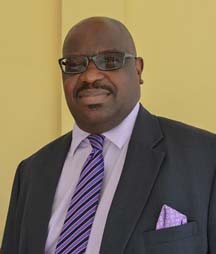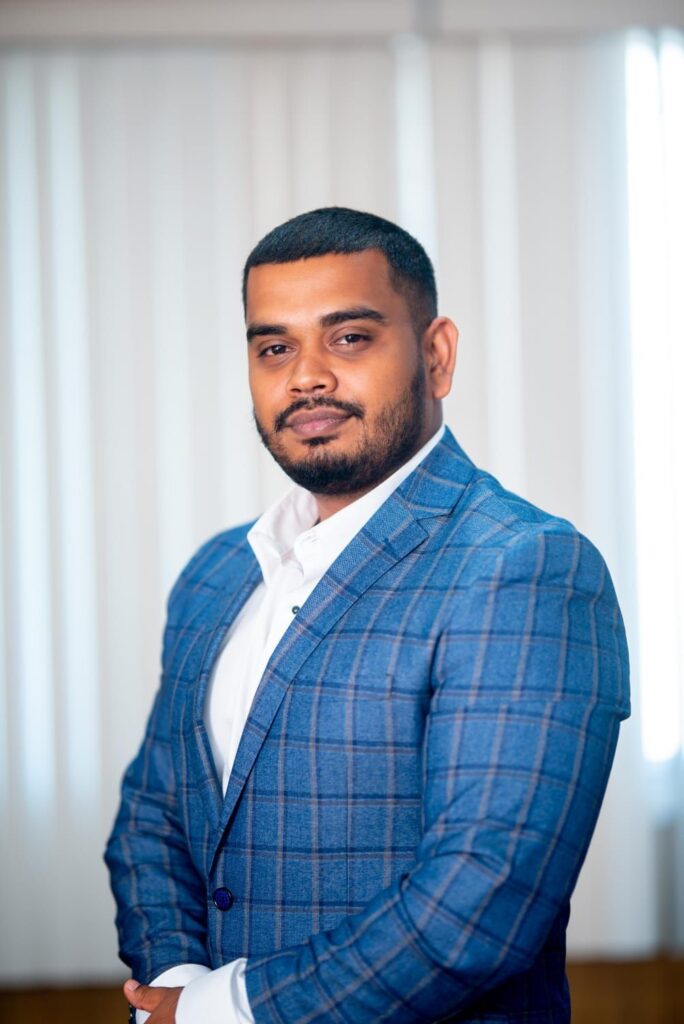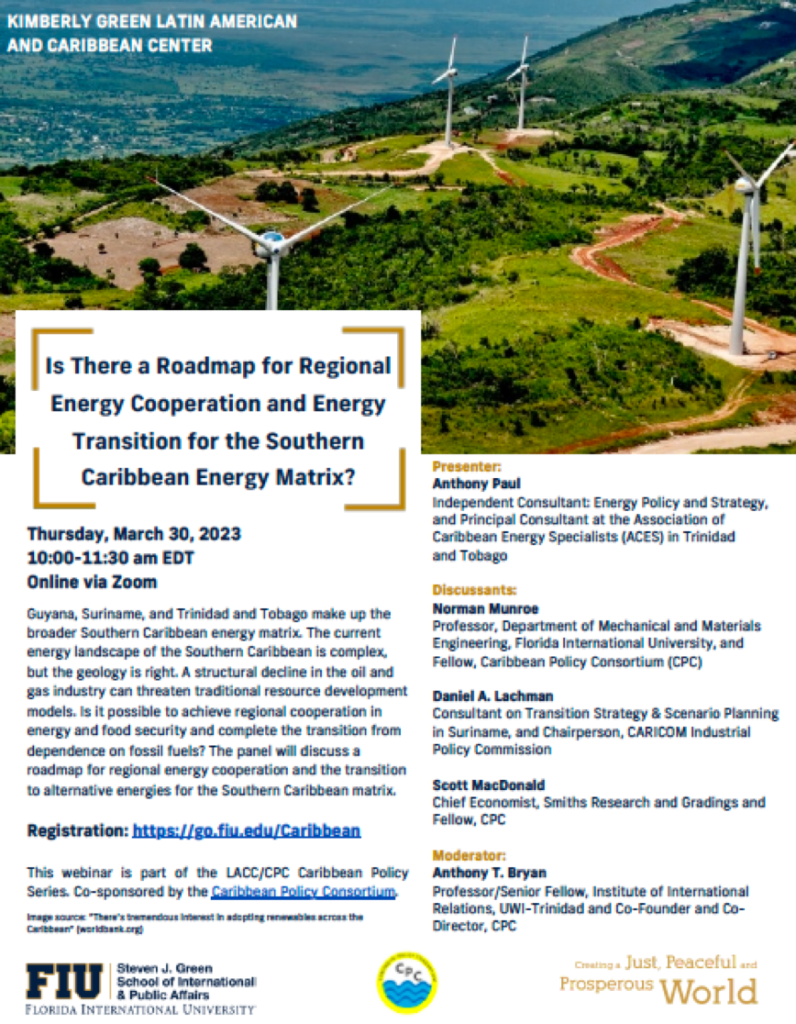
You can access the presentation by Prof Norman Munroe below
Full webinar is available on YouTube. Click below for access

You can access the presentation by Prof Norman Munroe below
Full webinar is available on YouTube. Click below for access
Please see the white paper here: Intersection of Energy_Environment in Guyana_Dr_Ulric_Trotz
Executive Summary: In 2015, significant oil and gas reserves were discovered in Guyana, transforming the country into a major fossil fuel producer. Before this discovery, Guyana, like other vulnerable developing countries in the Caribbean basin, had been advocating for international attention to their exposure to emerging climate risks and for the adoption of policies and provision of necessary support for climate change mitigation and adaptation.
These efforts led to a global agreement under the Paris Agreement in 2015 to limit the increase in global average temperature to well below 2°C above pre-industrial levels and to pursue efforts to limit the rise to 1.5°C, among other objectives. In keeping with its obligations under the United Nations Framework Convention on Climate Change, Guyana developed a Low Carbon Development Strategy and a Climate Resilient Strategy and Action Plan that aim to achieve zero carbon status and climate resiliency in line with the Paris Agreement. However, the discovery of substantial oil and gas resources in Guyana now places the country in a seemingly contradictive position as both a current victim of climate change and an actor that exacerbates the problem.
To reconcile these roles, two factors need to be considered. Firstly, Guyana lacks the resources to build climate resiliency and transition to an affordable and sustainable energy system. Secondly, as the world transitions to net zero, Guyana has the opportunity to use its newfound wealth to implement both mitigation and adaptation strategies. The region can address regional energy and food security, internalize supply chains, and utilize the resources of Guyana, Suriname, and Trinidad and Tobago to facilitate progress in meeting their obligations under the Paris Agreement. Given the low carbon intensity of Guyana’s oil and gas resources and the feasibility of production compared to global producers, there is an opportunity for Guyana to emerge as a major supplier of fossil fuels during the global transition to net zero. However, Guyana must ensure that its production of oil and gas meets the highest available environmental standards and that the resources accruing are used to facilitate the transition to net zero and to build climate resilience.



Relevant Quotations:

DavidLewis@ManchesterTrade.com

terrence.blackman@guyanabusinessjournal.com
Production of the Guyana Business Journal & Caribbean Policy Consortium.
Arlington Chesney:
Joel Bhagwandin:
David E. Lewis:
“Guyana regardless of how big and how dominant the oil and gas sector is going to become, beyond the numbers and statistics, what’s going to happen is the rest of the economy needs to continue to live and we need to find ways to get that to leverage.”
View full webinar here

Patricia Francis, Chairperson of Trade Facilitation Task Force & fmr Executive Director ITC, fmr President JAMPRO
KEY QUOTES:

Komal Samaroo, Executive Chairman of Demerara Distillers Limited
KEY QUOTES:
“Because we did not have a competitive environment, local production became a challenge, we could not compete against imports coming in, the cost of power, the shortage of skills, the lack of capital. I believe that with the situation where power cost is going to come down, infrastructure is being put in place and where there is more availability of capital, I think companies are looking to invest in areas that result in products that previously were imported can be available locally.”

Scott MacDonald, Caribbean Policy Consortium, and Chief Economist at Smith’s Research & Gradings
KEY QUOTES:
“Guyana is definitely on the map for foreign investment, it is attracting it within Latin America and we’re talking about a country with less than a million people. Guyana came in seventh in 2021 in terms of foreign investment. For a small country on the shoulder of South America, Guyana in many regards is punching above its weight.”
“It’s key to have awareness of what’s going on in the global economy, where you are, and in other words to put it mildly don’t get cocky Guyana. You’ve had a lot of success, you’ve moved ahead, you’re transforming the economy, you’re getting a socio-economic facelift but don’t get cocky about it because we live in a very competitive world.”
“As we’re doing the great energy shift globally, it’s critical Guyana moves to develop non-fossil fuels sectors, that goes from small medium-sized enterprises, offshore office centers, BPOs, the whole range of industry; but there’s no reason why Guyanese companies can’t issue forth from Guyana.”
“There’s a shopping list that goes with the vision thing for Guyana, that is the policy mix of improving education, development of human capital is critical, diversification from non-oil sectors, promotion of foreign direct invest but also promotion of local investment. We want to see a more competitive private sector in Guyana and I think that’s very critical.”
“Guyana’s transformation is definitely in motion, it has critical momentum, but the trick going forward is how do you keep the momentum, how do you keep those reforms going and how do you main the consensus in Guyanese society that this is the vision of where we want to go. I think the prospects are very good for Guyana, but there’s a lot of challenges that sit here.”

Andrew Schnitzer da Silva, CCO, Ascending Ltd., Workforce, Marine, Technical Training and Procurement
KEY QUOTES

David Lewis, Vice President, Manchester Trade Ltd. Inc. & Co-Chair, Caribbean Policy Consortium
KEY QUOTES:
“So there’s that risk and that danger that all this focus on the oil and gas crowds out the reality of the need to do the basic day-to-day homework of modernizing the economy, streamlining bureaucratic and regulatory procedures, and really get beyond and overcome still what I would call ‘hangover’ of the 60s and 70s and that state-controlled period. The view that there’s nothing good about what has been the experience of Guyana with foreign investors. I think you know that is still a work in progress and to the degree that we can begin to focus more on some of these new success stories beyond oil and gas.”

Terrence Blackman, Founder, Guyana Business Journal
The Guyana Business Journal (GBJ) & Caribbean Policy Consortium (CPC) present Episode Seven of their Webinar Series, Transforming Guyana.
DATE: Wednesday, December 14, 2022
TIME: 10:30 AM EST
In Episode Seven, Dr. Blackman, Dr. Lewis, and their guests explore Guyana’s emergence as a Petrostate and its implications for Guyana’s Indigenous Communities.
Please register and join us for an informative and insightful conversation.







This Wednesday, November 30, the Kimberly Green Latin American and Caribbean Center (LACC), in collaboration with the Caribbean Policy Consortium(CPC), will host the webinar “US-Caribbean Relations: From Trade to Economic Partnership.”
In this webinar, Ambassador Dr. Richard L. Bernal, OJ will present on the current status of US-Caribbean trade and prospects for the future with analysis from experts in the public and private sectors.
Panelists will examine how the existential crisis of CARICOM requires a wholistic approach by the U.S. which integrates economic, security and environmental aspects in a self-reinforcing program.
DATE: Wednesday, November 30, 2022
TIME: 10:00-11:30 am EST
Live webinar via Zoom
Free and open to the public but registration is required.
Registration: https://go.fiu.edu/Caribbean
Ambassador Dr. Richard L. Bernal, OJ
Professor of Practice, Sir Arthur Lewis Institute of Social and Economic Studies, University of the West Indies, Jamaica and Fellow, Caribbean Policy Consortium (CPC)
Andrea M. Ewart, Esq.
Attorney and Founder, DevelopTradeLaw, LLC and Fellow, CPC
Eric B. Wolff
Regional Senior Commercial Officer, Caribbean Region, U.S. Commercial Service, US Embassy Santo Domingo
Dr. Anthony Pereira
Director, LACC, Florida International University (FIU)
With a special emphasis on the English-speaking Caribbean, the LACC/CPC Caribbean Policy Series includes four webinars for the 2022-2023 academic year with experts from the Greater Caribbean region, moderated by FIU faculty and CPC members, and a series of policy-oriented papers addressing economic, political, and strategic matters in the region that will be published electronically as part of the LACC Caribbean Working Paper Series. The LACC/CPC Caribbean Policy Series is part of LACC’s renewed commitment to expand programming related to the English-speaking Caribbean, a sub-region with phenomenal human capacities, strong democratic institutions and incredibly rich socio-cultural and environmental diversity.
The University of the West Indies Institute of International Relations (IIR) in collaboration with the Caribbean Policy Consortium (CPC) and the H-Empire of the H-Net invite you to a webinar entitled “THE HAITIAN CONUNDRUM: CHALLENGES AND OPPORTUNITIES
DATE: Thursday, December 8, 2022
TIME: 5:00 p.m. – 7:00 p.m. AST
To register, click “Register Today ” in the attached flyer, or select Ctrl and click, or copy and paste the following link into your browser: https://sta-uwi-edu.zoom.us/webinar/register/WN_v_mi4TrbTK-98rSe27deOA
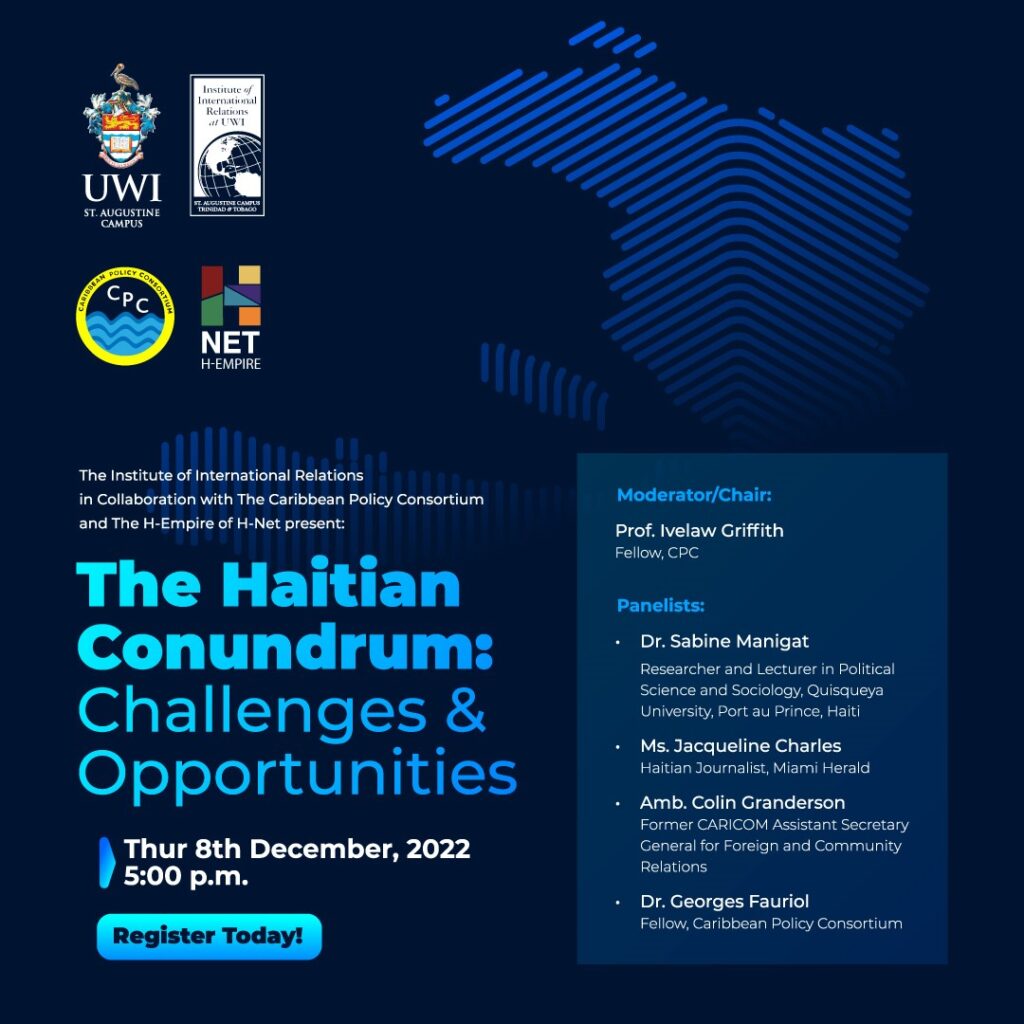
Professor Ivelaw Griffith
Fellow, Caribbean Policy Consortium
Dr. Sabine Manigat
Research and Lecturer in Political Science and Sociology,
Quisqueya University, Port au Prince, Haiti
Jacqueline Charles
Haitian Journalist, Miami Herald
Ambassador Colin Granderson
Former CARICOM Assistant Secretary General
Foreign and Community Relations
Dr. Georges Fauriol
Fellow, Caribbean Policy Consortium
The Caribbean Policy Consortium (CPC) & Guyana Business Journal (GBJ) invite you to Episode VI of Transforming Guyana: Guyana’s role in a world that still needs oil: Domestic and regional energy security and the USA CESI
You can view the entire presentation here
Roger Kranenburg, Vice President, Energy Strategy and Policy, Eversource; Anthony Bryan, Senior Fellow , Institute of International Relations UWI, St.; Augustine, Trinidad and Tobago; Dax Driver, CEO & President, Energy Chamber of Trinidad & Tobago; Lorraine Sobers, Lecturer, Department of Chemical Engineering Petroleum Studies Unit, University of the West Indies; and Bobby Gossai, Jr., Senior Petroleum Coordinator, Petroleum Management Programme, Ministry of Natural Resources, Guyana.
Terrence Blackman, Ph.D., Founder & CEO Guyana Business Journal terrence.blackman@guyanabusinessjournal.com
Dr. David E. Lewis, Fellow and Co-Chair, Caribbean Policy Consortium DavidLewis@ManchesterTrade.com
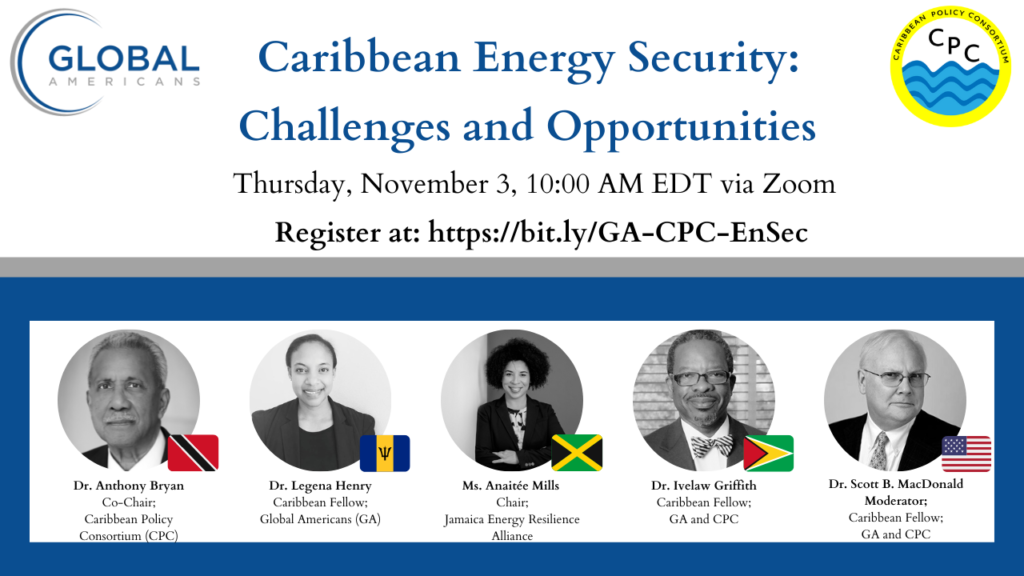
This webinar was jointly hosted by Global Americas (GA-www.theglobalamericans.org) and the Caribbean Policy Consortium (CPC-www.cpccaribbean.org) featuring regional experts on the state of energy security, GA and CPC fellow Scott Mac Donald moderates the discussion.
You can download presentations below:
Recording available here:
DATE: October 12, 2022
TIME: 10:30 AM- 11:30AM EDT


